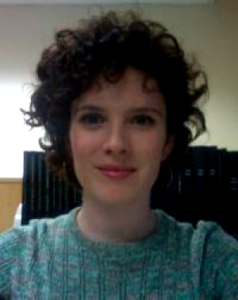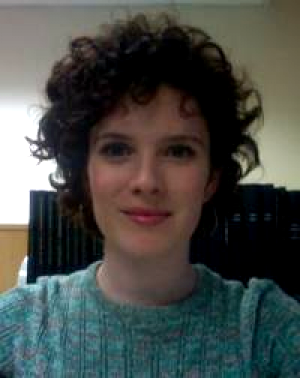Rencontre avec Iris Cushing
Dear Iris. Could you please tell us what your relationship to language is through your poetic work ? Could you tell us how you connect with language through your poetry ?

Iris Cushing
This spring, I’m teaching a basic writing class at a small college here in Brooklyn, and it suddenly occurred to me one day how simply amazing it is that language is the primary tool that we have to teach each other about language. When I’m talking about how to use a comma or an apostrophe, I’m using commas and apostrophes. I can’t think of any other system that works that way. When I’m making a poem, I try to stay very aware of not just what I’m saying, but what the limits of language will allow me to say. It’s very fun to come up against certain limits, moments when I realize “oh, I can’t say that, it doesn’t make sense,” and then find a way for it to make sense. The experience of using words in that way feels very true to the stories and emotions and images I’m creating. All of my poems are based on things I’ve actually experienced; I think my work as a poet is to find a way to transform personal experiences into verbal structures that constitute a new kind of experience.
In the Boston Review, the critic Katy Lederer wrote, about your poems : "Reading this work, I fell in love again with language. Not because it is beautiful or even particularly true, but rather because it transports." What are you looking for in poems ?
Like Katy, I can definitely “fall in love” with transporting poems. When reading, I get very excited by poems that reach outside of the normal limits of what we consider a “poem,” what we consider “normal usage” of things like parts of speech, names, and narratives. I get excited when a poem is so curious about its own limits that it risks complete failure. When writing, I guess I’m looking for that too, although I realize that I’m not going to write in the same way as anyone else.
Could you tell us something about the mind of the splendid and surprising State Report ?
There are a lot of puns and verbal jokes that occur to me in unexpected moments, almost as if they are spoken to me by a voice coming from elsewhere. The poet Jack Spicer said something about a poet being like a radio that picks up signals from outer space; that perfectly describes where my puns come from. The idea to use “Wyoming” as a verb occurred to me in just such a way. I had several different versions of the poem, and I eventually settled on this one as the “finished” one. Something about the solitude and sense of longing conveyed in the poem belonged with Wyoming, which can be a very solitary, contemplative place.
You are a poet, and also a publisher of Argos Books publishing. What about your publishing work? What is the mind? The way? Could you elaborate on your work philosophy ?
My friend Elizabeth Clark Wessel and I started Argos Books two years ago, because we both love books and wanted to be involved with a community of people who also love them. We have a third editor, E.C. Belli, who is also a brilliant poet. I am a deep believer in making more of whatever you love in the world. I love contemporary poetry, especially innovative writing that opens up new questions about what’s possible with language. It’s a thrilling creative experience, reading and choosing and putting together books. It just so happens that most of the work we publish is by women.
To be a publisher as well as a poet, you must have a conception of words, maybe of the world, too ?
There’s an aspect of publishing that’s all about business : marketing, networking, and distributing your books. That part can feel very un-creative and boring. I’m still in the process of learning how I want Argos to “live” in the world, and I feel the same way about my own poems. The two endeavors go hand-in-hand. The poet Anna Moschavakis once said that small-press publishing was like a “big collaborative art project”; I love thinking of it that way.
The poet and translator Jacques Burko said that to translate poetry one must be a poet oneself. Are you also translator? If so, what does translating poetry mean to you? Does it mean loyalty to the poem at start or allowing the passage of a vision from one language to the other ?
I studied translation while I was getting my Master’s degree at Columbia, and have translated some poems from Spanish by Eugenia Brito and Marosa di Giorgio. Currently, Liz Clark Wessel (who is a translator from Swedish) and I are co-editing a magazine called Circumference, which focuses on poetry in translation. So, translation is something that I care very deeply about. The best translations, I believe, are done by people (poets or not) with an intimate understanding of both the language they’re translating from, and the spirit and intention of the poem they’re working with. I think being loyal to the literal “meaning” of a poem means being true to the time, place, and situation in which the poem was written, as well as to the poet who wrote it, which oftentimes leads a translator away from word-for-word translation.
You publish artists’ books. There were a lot of artists books in France in the 20e century, with René Char, Picasso, Miro… What is the purpose behind their limited edition ?
What books and works of art have in common is that they are both objects—they both have aesthetic considerations that influence how a viewer or reader experiences them. It’s very satisfying to me to make books that not only include visual art, but are considerate of the viewer/reader’s aesthetic experience, that try to make it interesting in some way. I’m fascinated by the history of artists’ books, and poets who have collaborated with artists in general. Actually, I find poetry to be more like painting than it is like other kinds of writing—fiction, journalism, etc. A poem can be like a verbal painting… I want the books I make to explore that.
At last, dear Iris : is there a poem which always goes with you ? Is there a poem which never leaves you ?
What a good question ! “The Proverbs of Hell” by William Blake is permanently etched in my memory. It’s not a poem exactly, but it was written by one of the greatest poets ever, contains very beautiful language, and offers very useful advice, such as: “Think in the morning. Act in the noon. Eat in the evening. Sleep at night.”
Propos recueillis par Matthieu Baumier et Gwen Garnier-Duguy avec l’aide d’Asha Gopaul-Pfau
